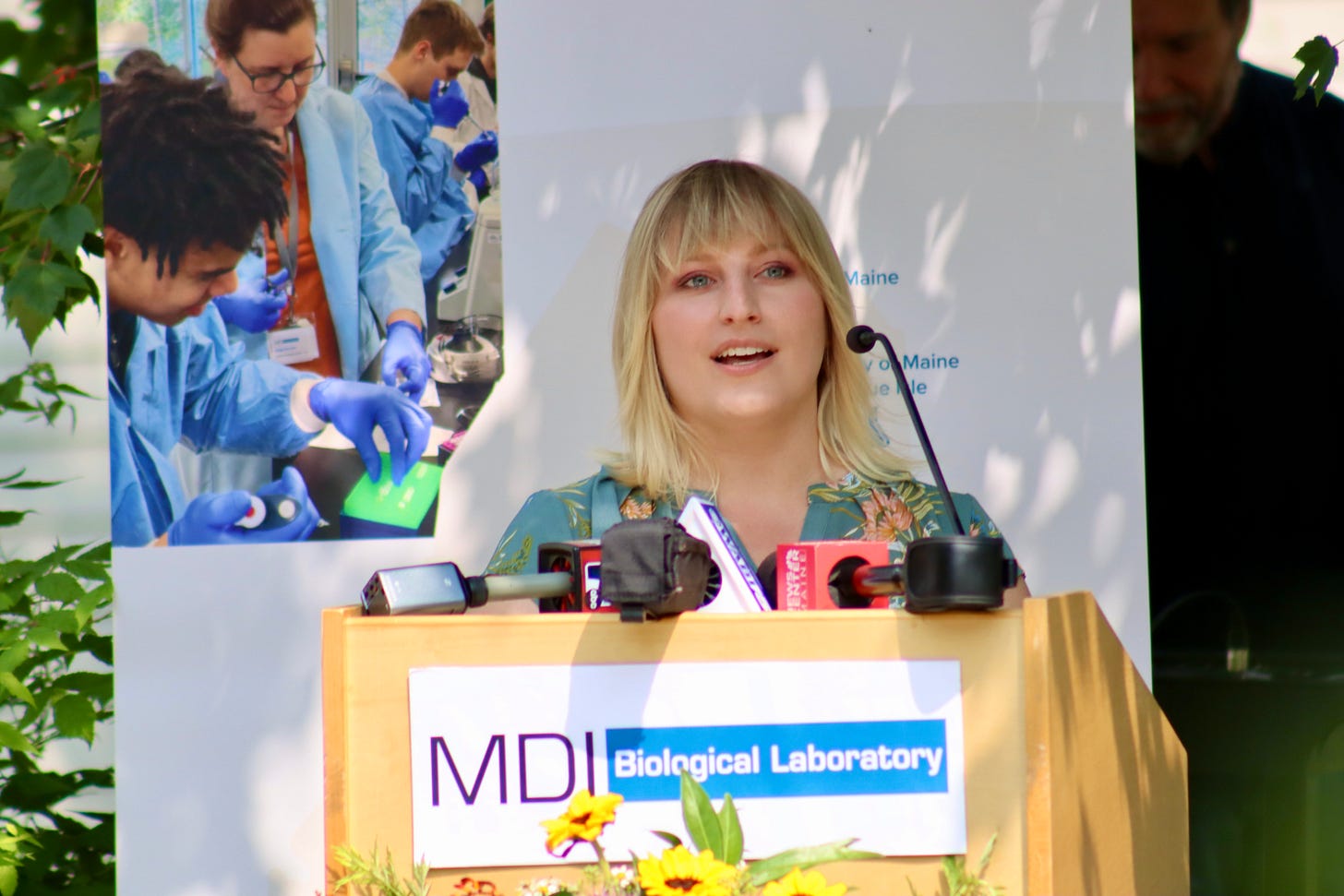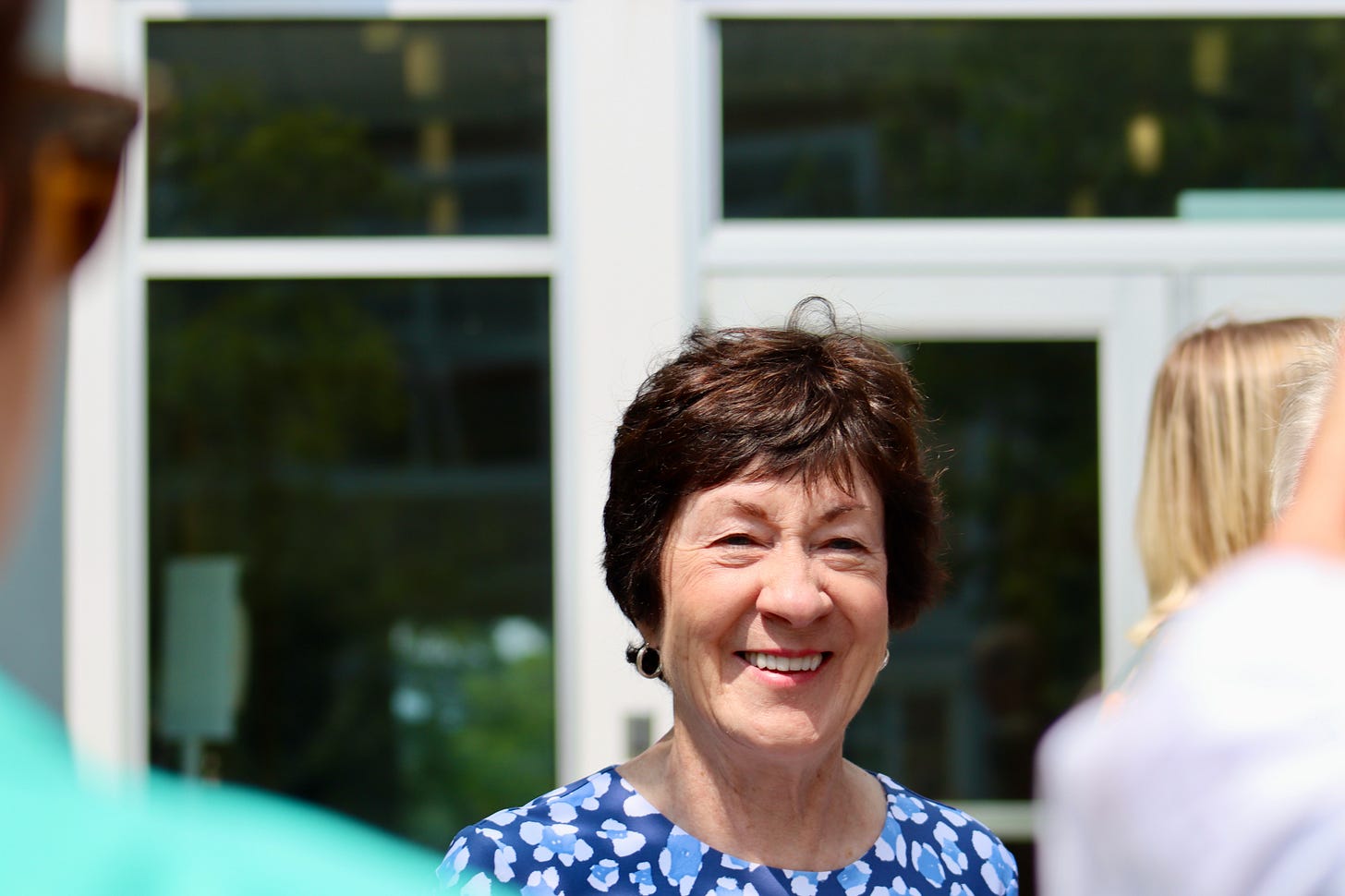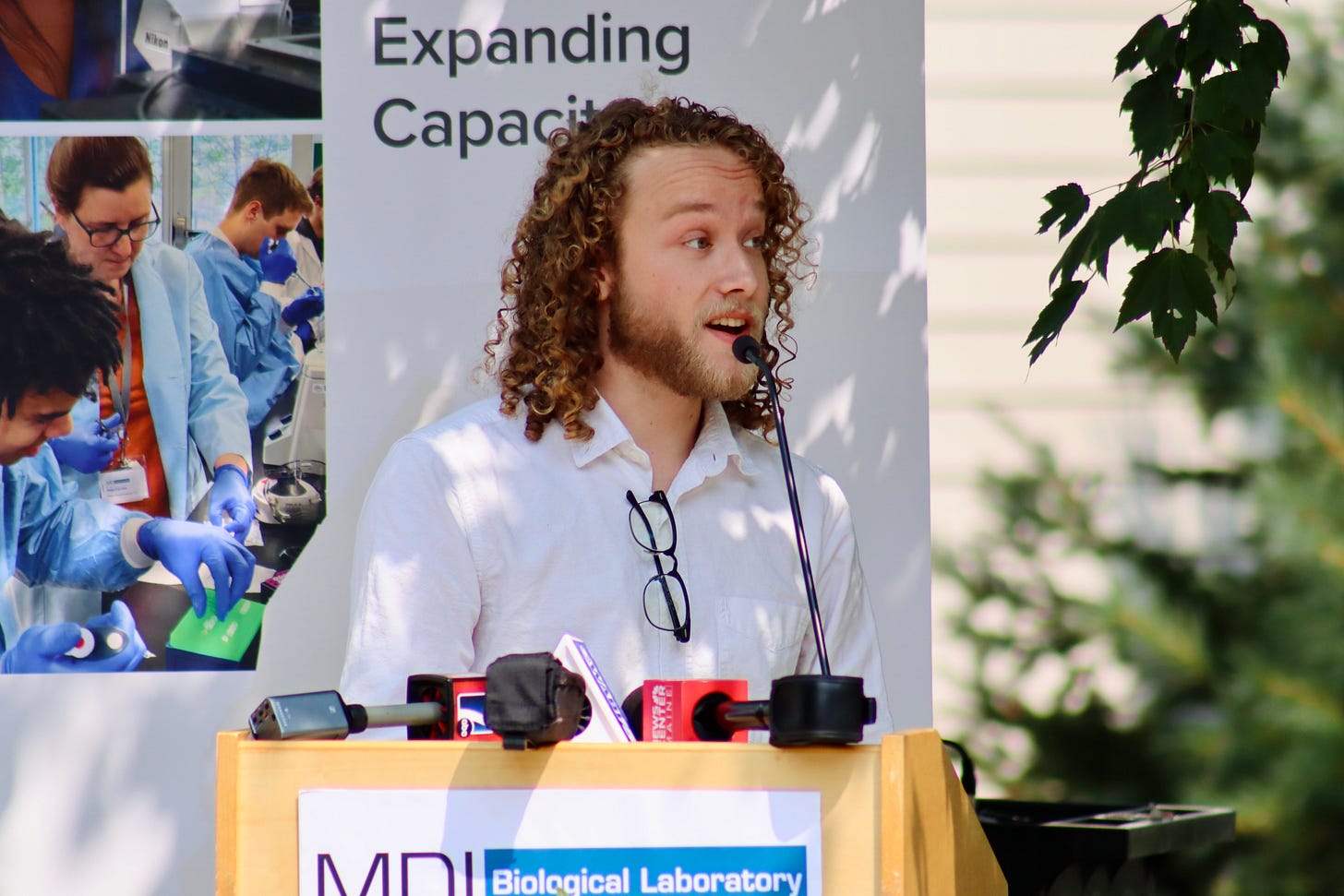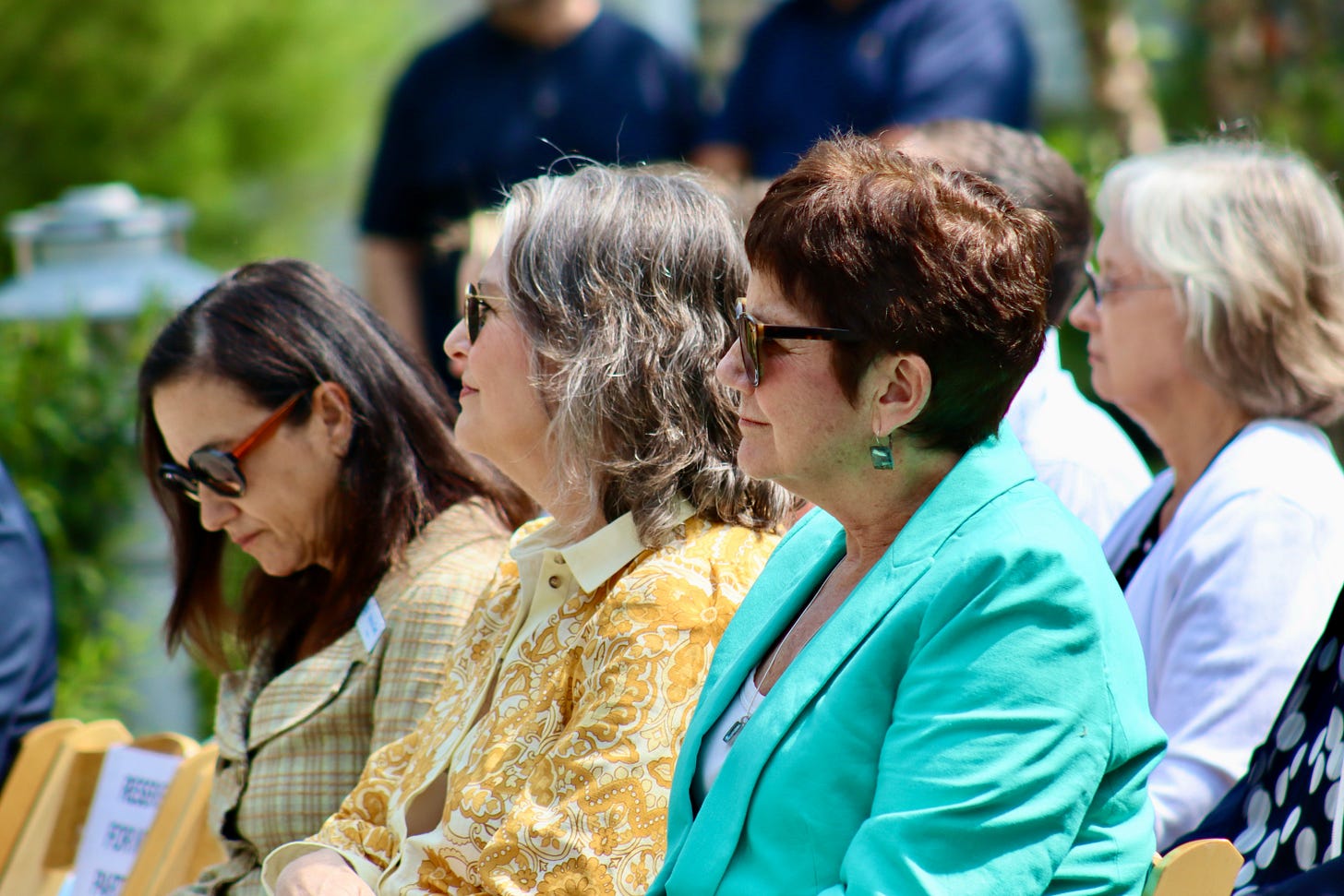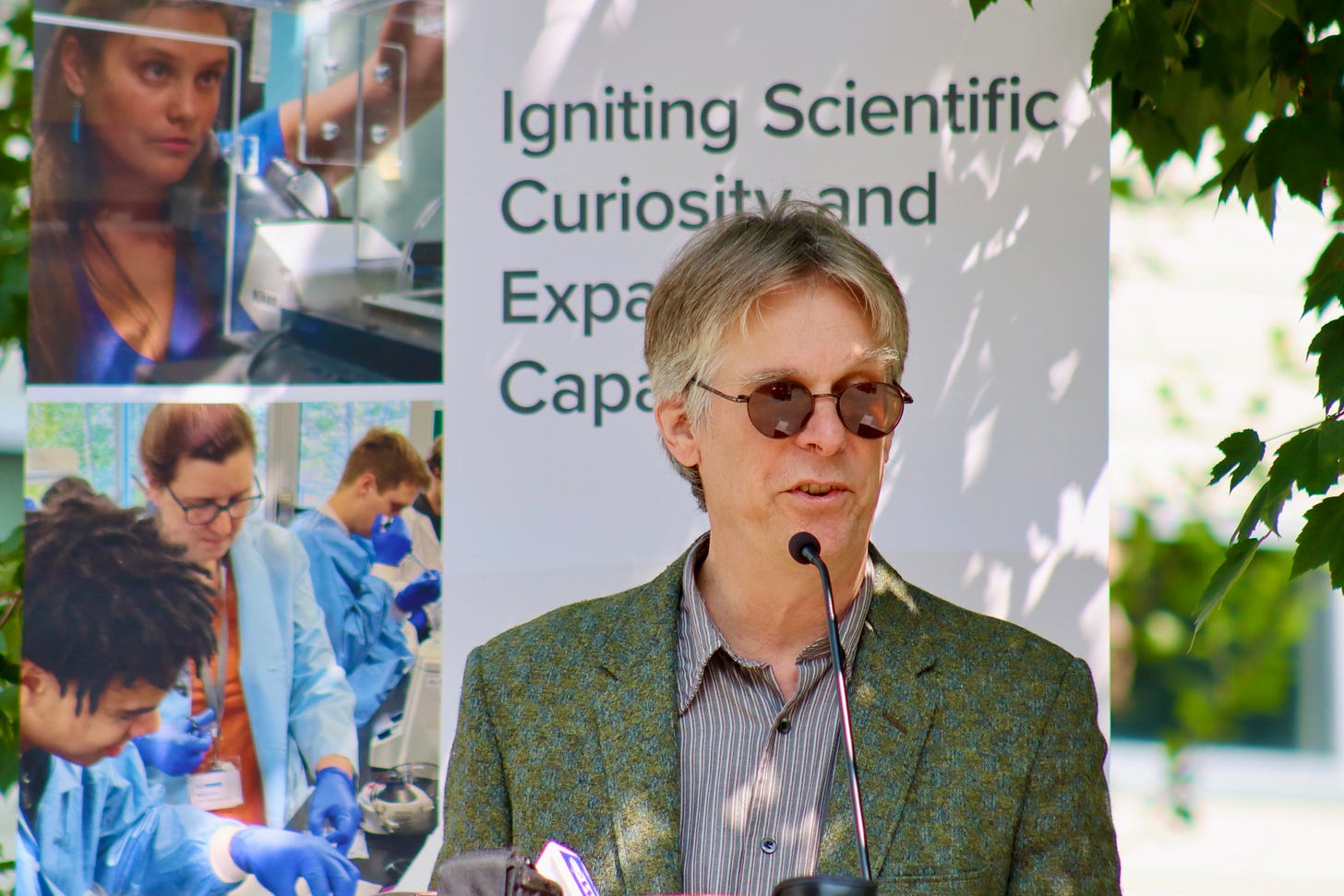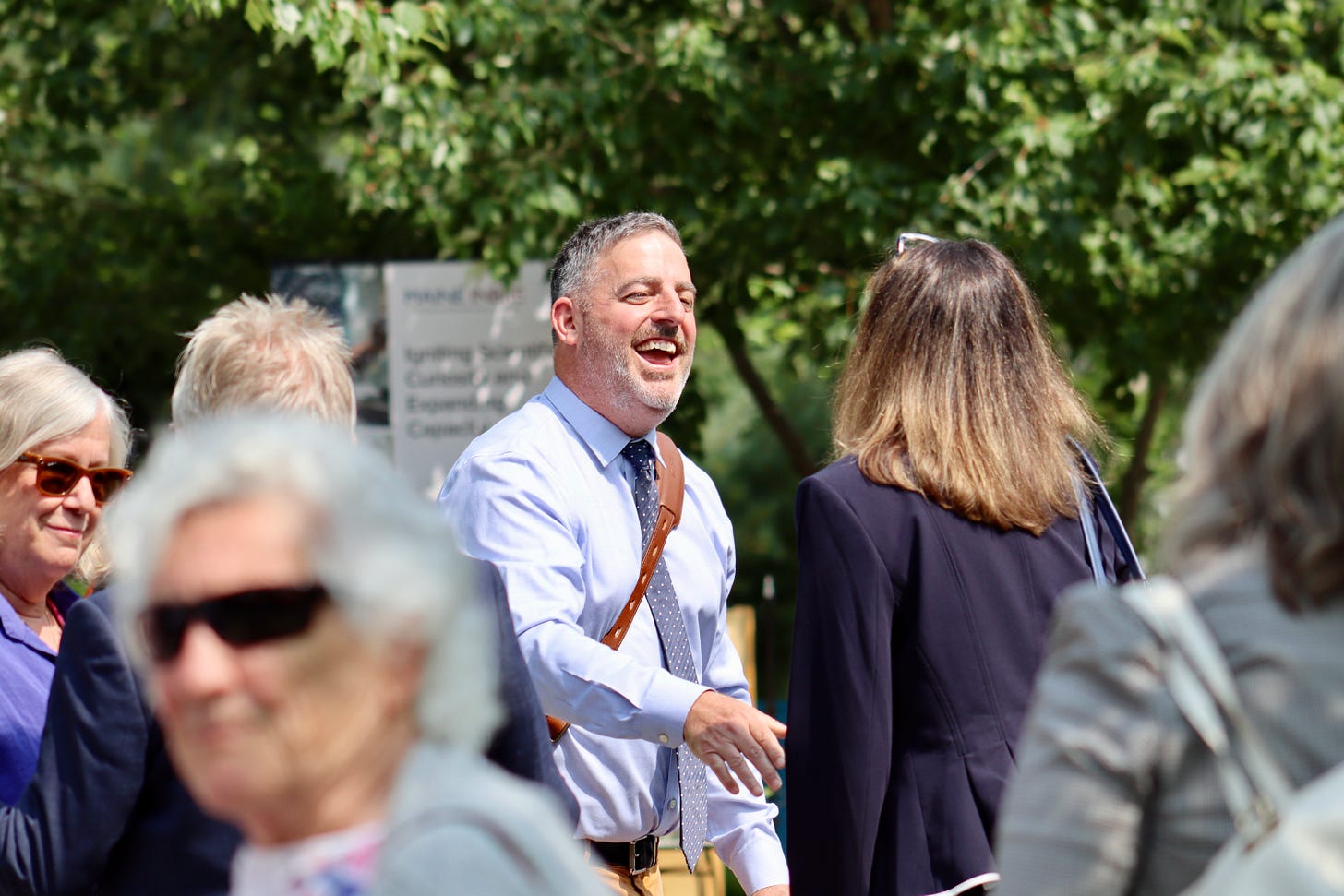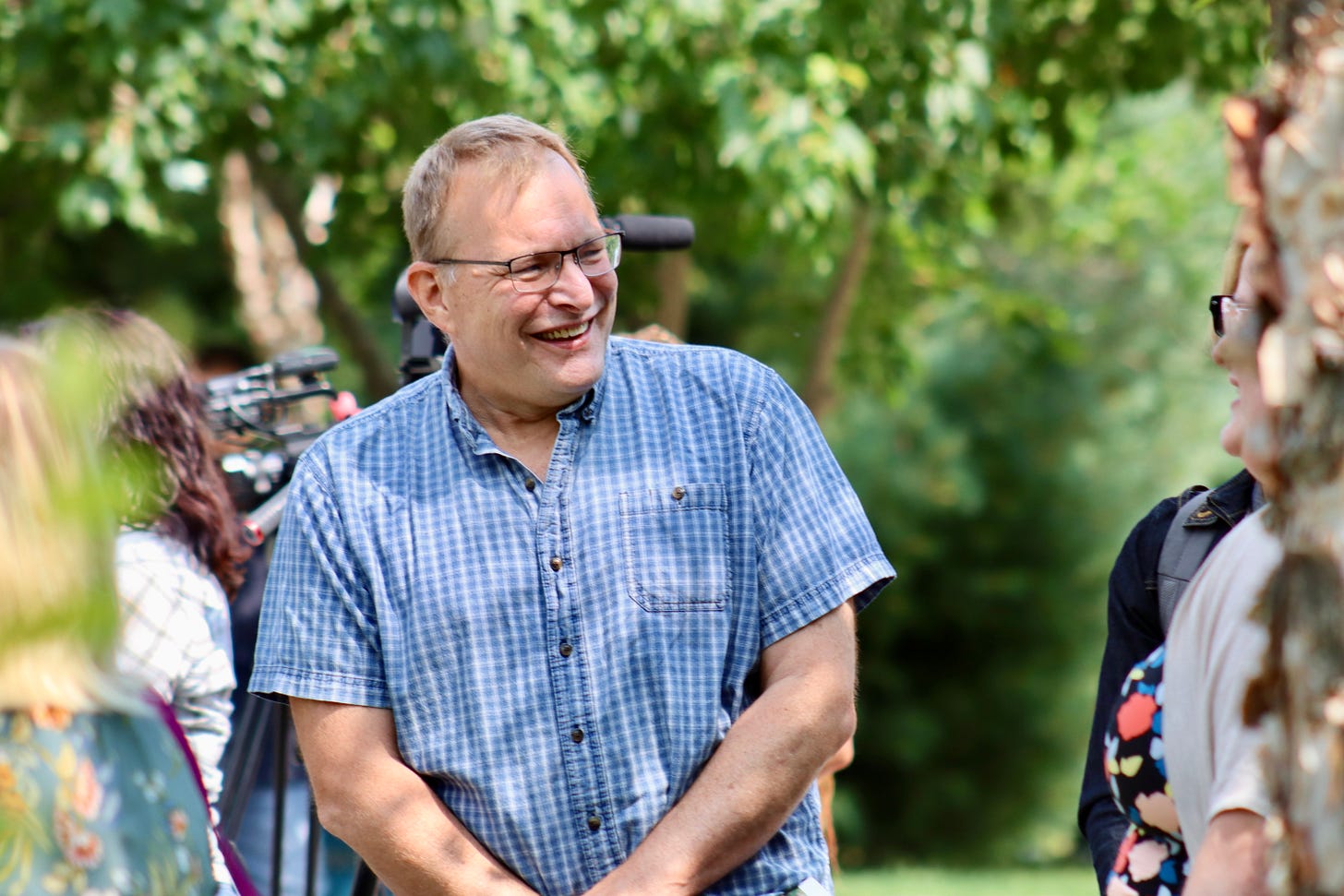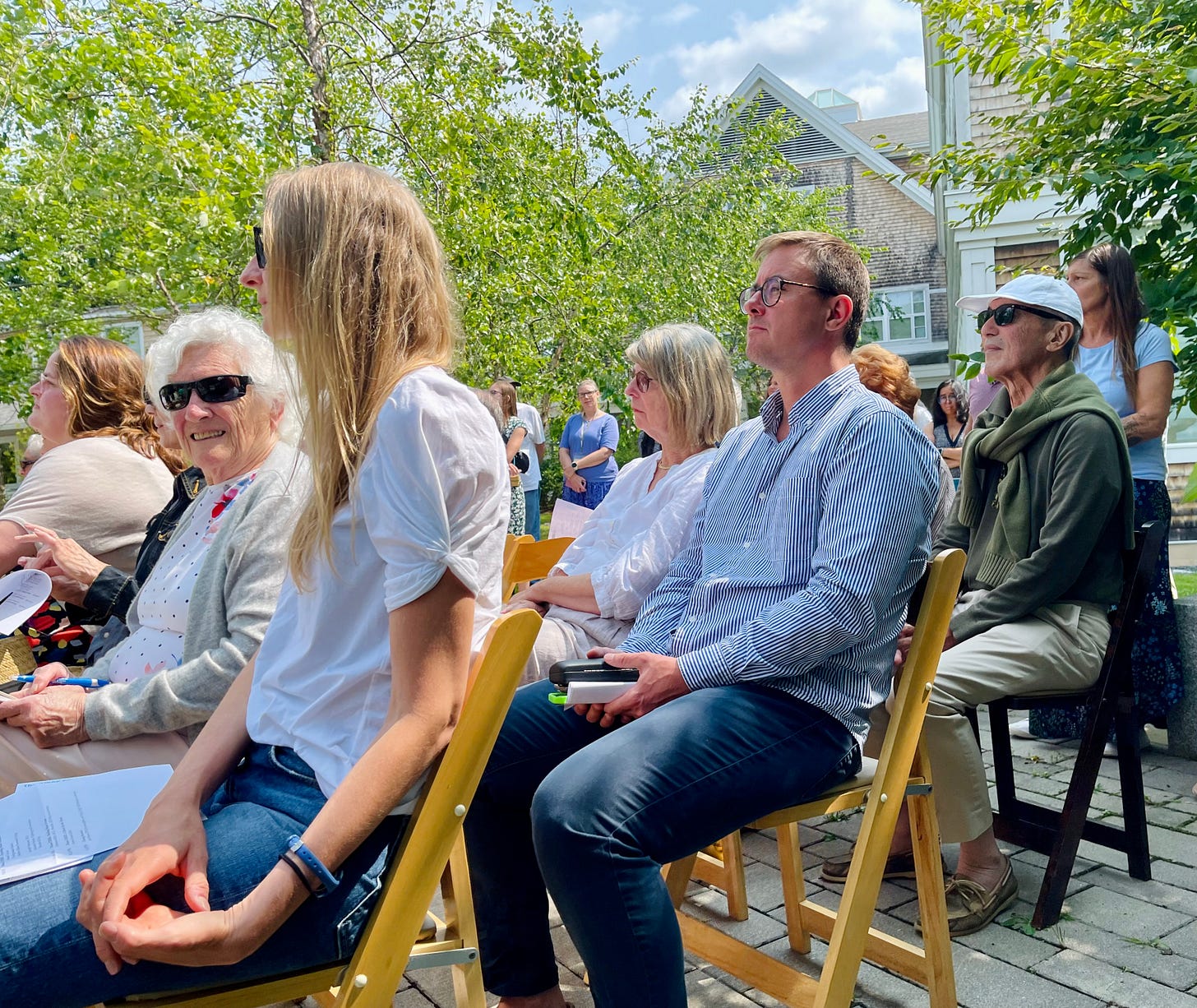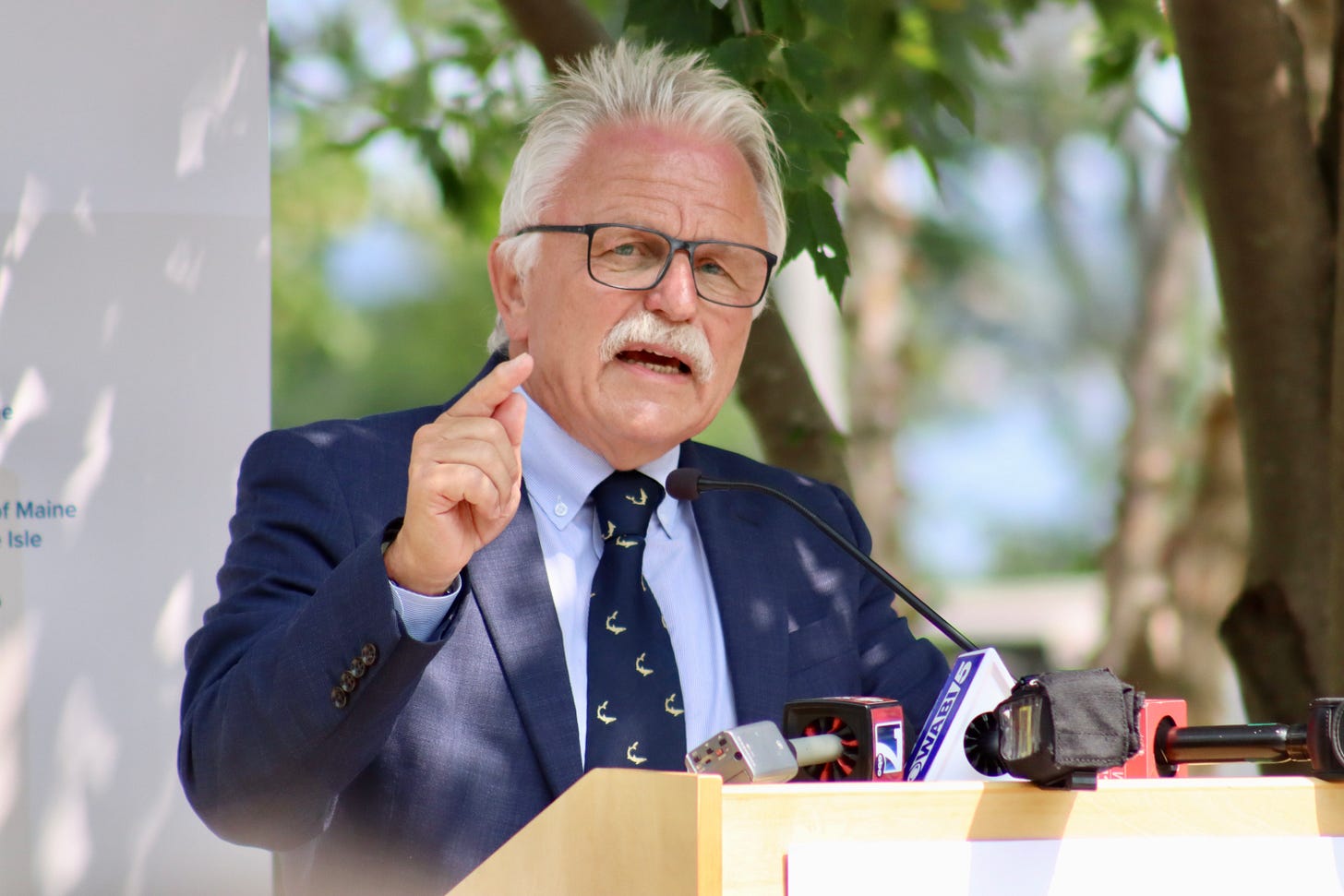Senator Collins Announces $19.4 Million Grant To Keep Undergrad Scientists In Maine
MDI Biological Laboratory celebrates INBRE renewal and biotech revolution
The Bar Harbor Story is generously sponsored by Paradis Ace Hardware.
BAR HARBOR—You don’t need to be in Silicon Valley, the Research Triangle, or Boston to make a difference in the biomedical field, Senator Susan Collins told a crowd gathered at the MDI Biological Laboratory Tuesday morning to celebrate a renewed grant from National Institutes of Health (NIH) for a $19.4 million NIH grant to renew and expand the Maine INBRE (Idea Network of Biomedical Research Excellence) network.
“Remarkable research is taking place right here in Maine. The Maine INBRE is helping to make it possible,” Collins said.
The INBRE network is led by the MDI Bio Lab and it’s a consortium of research and higher education institutions that helps young Mainers, undergraduates, and Maine to fully participate in the biomedical/biotech revolution, with its benefits for human health and high-paying jobs, according to information from the lab.
The program made a difference to Jennifer Honeycutt, PH.D and assistant professor of psychology and neuroscience at Bowdoin College who said she was a first-generation IBRE student, a queer-identifying person who came to college not knowing what to do. Now Dr. Honeycutt is a primary investigator at Bowdoin. The professor credits the time at the lab and the program for being the spark that changed her path.
”I felt seen. I felt accepted,” Dr. Honeycutt said. She switched her major concentration to neuroscience. Dr. Honeycutt has said that it “encouraged me to do the things that I didn’t think I could do.”
She did them, hands on, in the lab, and the rest was history for her and the 90% of INBRE graduates that pursue advanced degrees or careers in medical and science fields.
The program is making a difference to Samuel Cousins, an undergraduate student at Southern Maine Community College who recently was a part of the program.
And it’s made a difference to thousands more.
There are nearly 500 life science companies in Maine, Collins said. “Together those companies have created nearly 10,000 Maine jobs.” Those jobs, she said, are great ones, with average incomes over $100,000 a year. It has directly invested $87 million in Maine so far.
The biomedical sector has grown by 45% in the past five years, said Dr. Hermann Hallier, president of the laboratory. INBRE is the “backbone of Maine’s live science sector,” he said.
Those are important metrics, but in a field full of data and facts, what INBRE has done, many stressed, is create opportunity in young people who are involved.
Cousins graduated high school in the middle of the COVID-19 pandemic. He didn’t go straight to college and took an assortment of jobs, such as property maintenance, before heading to school.
And in college, he fell in love with biology.
When the INBRE opportunity came, he was really excited, he said. He could remember his dad, a high school science teacher, coming home thrilled about new innovation, telling him that the future of biology is forever changed.
Now, Cousins said, he gets to be a part of that future. The INBRE experience confirmed his passion.
He has told the laboratory that his week with the scientists researching stem cell activity created an experience that made a difference.
“Before this it was all in my head. It was mostly book-learning,” Cousins said.
But the program allows undergraduates to work with scientists on the research, partnering, helping, learning, and doing.
“It’s totally immersive,” he said. The techniques he learned included tagging a segment of DNA so that researchers could follow that piece’s molecular activities.
“Think of how many amazing stories will be a result of the INBRE program,” Collins said and advised Cousins to keep in touch. She wanted to see what he was up to, what he discovered, how his science influenced the world.
“This spark is really changing the entire community of Maine,” said Jerilyn Mitchell Bowers, VP of essential affairs at the laboratory.
Since 2001, more than 2,800 Maine students have received hands-on biomedical research training through the Maine INBRE program.
“We’re investing in future growth and opportunity,” then-Governor John Baldaci said back when the INBRE’s receipt was announced in the early 2000s. “It’s the bright light of the economic future.”
In addition to teaching specialized research techniques, INBRE training also encourages students to ask thoughtful questions, think critically, develop meticulous attention to detail, and generate good problem-solving skills—valuable assets to any employer.
Since the program has begun, it’s been award $106 million in direct federal funds and $110 million in leveraged grants, Collins said. She also singled out Dr. Patricia Hand for her leadership and catalyst for research and innovation at the program and the laboratory from 2001 to 2016.
With this new award, the Maine IDEA Network of Biomedical Research Excellence (Maine INBRE) will expand to include 17 Maine colleges, universities, and research institutions that collaborate to:
provide thousands of undergraduates with genuine biomedical research experiences and access to state-of-the-art equipment through intensive courses, workshops and paid fellowships, transforming their goals and helping to build a technically skilled bioscience workforce for Maine.
support young bioscience faculty in Maine with grants and lab equipment they need to compete for larger federal grants, and;
invest in shared, state-of-the-art science infrastructure at participating institutions, from advanced gene editing and data science systems to state-of-the art 3D microscopy.
New network members include the University of Southern Maine, the MaineHealth Institute for Research, and UMaine Augusta. It already includes MDI Bio Lab, most UMaine campuses, SMCC, JAX, Colby, Bates and Bowdoin colleges, COA, and UNE.
MORE MAINE INBRE FACTS FROM THE MDI BIOLOGICAL LABORATORY
The Maine INBRE:
provides thousands of undergraduates with genuine biomedical research experiences and access to state-of-the-art equipment through intensive courses, workshops and paid fellowships, transforming their goals and helping to build a technically skilled biomedical workforce for Maine;
supports early-career bioscience faculty in Maine with research grants, lab equipment and other resources they need to compete for larger federal grants, and;
invests in shared, state-of-the-art science infrastructure at participating institutions, from advanced gene editing and data science systems to leading-edge 3D microscopy, building the state's overall research capacity and standing as a home for world class science.
Creates a Technically Skilled Workforce
Since 2001, more than 2,800 Maine students received hands-on biomedical research training through the Maine INBRE program. In addition to teaching specialized research techniques, INBRE training also encourages students to ask thoughtful questions, think critically, develop meticulous attention to detail, and generate good problem-solving skills—valuable assets to any employer.
Careful tracking of students participating in the INBRE program shows a:
65% increase in the number of science majors at participating colleges over the past 5 years.
Of all students who have participated in the INBRE program and obtained their bachelor’s degrees:
90% are pursuing higher education or careers in health-related fields
21% are pursuing advanced degrees/careers in Maine
Creates an Innovation Economy in Maine
Over the last two decades, the INBRE program has:
Provided Maine with $87 million in direct research and training funding (will rise to $106 million with new award);
Created and sustained over 100 jobs in Maine’s research and educational sectors;
Created an outstanding model for institutional collaboration and public-private partnerships;
Provided an important catalyst for spurring research and innovation throughout Maine;
Together with other Maine IDeA programs, allowed Maine research and educational institutions to successfully compete for more than 1,900 federal research grants, bringing more than a hundred million dollars into our state.
Improves Competitiveness
Two key indicators of the improving productivity and competitiveness of Maine scientists are the number of publications accepted by peer-reviewed scientific journals and the number of successful grant applications.
In the last two decades:
The number of accepted publications submitted by INBRE-funded scientists nearly tripled (to more than 700);
The number of published papers with undergraduate authors increased five-fold;
One-third of INBRE-funded scientists “graduated” from the program with their own independent research grants;
$106 million in additional grants have been awarded in Maine as a result of INBRE funded research.
About MDI Biological Laboratory
For more than 125 years, MDI Bio Lab has been a center for training and research in comparative biology. In the last two decades its biomedical research has focused on aging, regeneration, and environmental toxins.
The Laboratory houses 11 research groups staffed by an international team of world-class scientists and graduate students. It also leads a statewide network of colleges, universities and research institutions that collaborate to provide training, research experiences and financial support to help young Mainers play a bigger role in today's biomedical revolution.
Located on Maine’s rugged coast, the Laboratory’s 100+ acre campus houses research facilities, cottages and dorms that house visiting scientists and students. It is also home to MDI Bioscience, a subsidiary working to design innovative techniques to speed the drug discovery process.
LINKS TO LEARN MORE
Photos: Carrie Jones/Bar Harbor Story
If you’d like to donate to help support us, you can, but no pressure! Just click here.
If you’d like to sponsor the Bar Harbor Story, you can! Learn more here.







